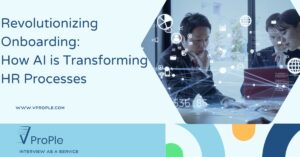This website use cookies to help you have a superior and more relevant browsing experience on the website.
Archives
Empowering Remote Teams: Best Practices for Engagement and Productivity
Traditionally, working from home was a privilege that was only given to a selected few employees under some circumstances. But the pandemic has changed everything! Today, employees not only want to work from home but also expect full support from the company’s end when they are working remotely. 70% of professionals still want to maintain […]
read moreRevolutionizing Onboarding: How AI is Transforming HR Processes
Today, AI makes a big difference in the daily operations of a business. Thanks to the dawn of a new era in the business world where Artificial Intelligence (AI) is a changing force that is reshaping many business aspects. Onboarding is one such process that has undergone a revolutionary shift after the advent of AI. […]
read moreHybrid Work Models: A Game Changer for Employee Satisfaction and Retention
Companies want their employees to work from the office, and employees want to work from home. The question here is, who will get what they want? The answer is- both! The future of work is hybrid (two or three days a week in the office), where companies and employees both will get what they want. […]
read moreNavigating the Future of Work: Key Skills for the Future Workplace
The future work and skills will look very different from what we know today. Thanks to the advancements in technology, AI and automation, how we work is changing at a breathtaking speed. This impacts the skills employees need. Due to traditional roles becoming automated and the emergence of new positions demanding new skills and abilities, […]
read moreRemote Employee Engagement Strategies: Building a Connected Virtual Culture
Remote work has become a norm in today’s tech-driven business landscape. This work arrangement brings many benefits, like increased productivity and flexibility. Yet, it has its own set of challenges. The most common challenge companies face with remote employees is keeping them engaged. Lack of physical interactions, miscommunication and misunderstandings, isolation from colleagues and digital […]
read more






